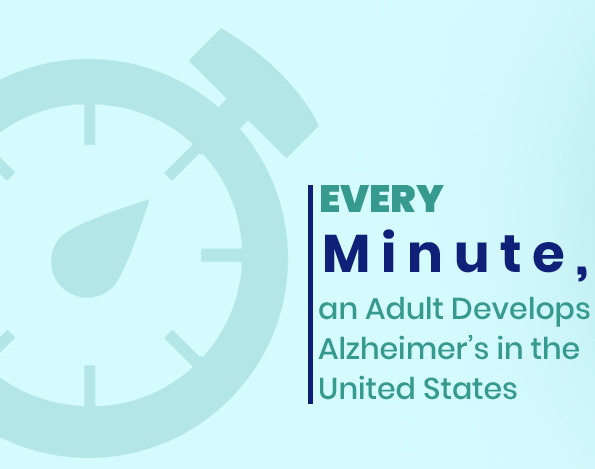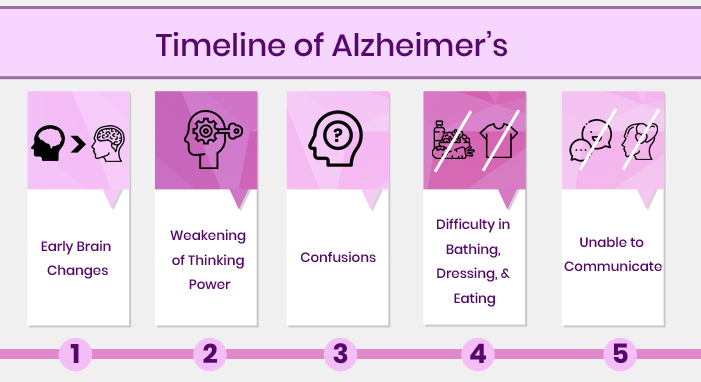Caring for the Elderly with Alzheimer’s

About this Guide
This guide is intended for individuals who act as a family caregiver or a professional caregiver for the elderly with Alzheimer’s disease. This disease causes people to lose their ability to think, remember, and make decisions over time.
Alzheimer’s is a harsh reality that can be controlled but can’t be avoided. Over time, this ailment worsens, and individuals rely entirely on caregivers for daily chores and even for basic personal care tasks. Taking care of a person with Alzheimer’s or dementia can be rewarding, even though it can be very challenging, hectic, and stressful.

Most people do not realize how challenging it is to be a caregiver for an Alzheimer’s patient. We have created this guide to give you a hand in coping with the challenges, remind you that you need to take care of yourself, and help you improve your care delivery.
The Stages of Alzheimer’s Disease
Alzheimer’s Disease has different stages that define the complexity of the ailment. These are the early-stage/mild stage, the moderate stage, and the severe/late stage. As a caregiver, it is crucial for you to understand these stages to help in making an adequate care plan. You can better cope with the behavior-related changes and overall response from your charge by understanding their current stage of the ailment.
The Early Stage: People in the initial stage of Alzheimer’s often face memory loss issues and have difficulty recalling instances. There might be some minor changes in their personality, which can also lead to confusion regarding simple tasks in their daily routine.
The elderly also face issues in simple calculations and planning & organizing. As a caregiver, don’t ignore these early symptoms as it indicates a severe health issue. Adequate counseling and medication could help, but this ailment isn’t reversible.
The Moderate Stage: The moderate stage is the middle stage of Alzheimer’s, in which confusion and behavioral changes are more frequent. The elderly often face issues in dressing, cleaning, and maintaining personal hygiene during this stage. There also could have difficulty getting enough sleep, along with serious personality changes.
One of the other issues within this stage is that the elderly could face problems related to incontinence, which means difficulty in controlling urine. Inadequate control over bowels and bladder is common during this stage. Caregivers need to be aware of these symptoms, which is perhaps a significant challenge while delivering care.
The Severe Stage: This is the final and last stage of Alzheimer’s, which remains until the last breath of the individual. Late-stage Alzheimer’s requires patient care all day long, with adequate support for daily chores. Walking, sitting, or sleeping becomes more difficult and needs help from a caregiver.

These individuals often won’t be able to recognize close relatives and can face issues while swallowing. Caregivers need to focus on adequate nutrition for the elderly in this state, as it is common that they will refuse to eat. Experts say that during this last stage, Alzheimer’s patients require intensive care, which depicts that the caregiver should be prepared well beforehand both physically and mentally.
Caring for Alzheimer’s Patients
Alzheimer’s disease is an illness that leads to the destruction of numerous brain cells and will affect the overall thinking and reacting capacity of an individual. They are often confused, which is perhaps the reason why caregivers need to emphasize certain aspects.
You should also understand that it is the ailment that is making the person change and not their personality. Here are many challenges that are faced by caregivers while caring for Alzheimer’s patients and how can they overcome those trials.
Behavioral Changes
One of the biggest challenges that caregivers come across while caring for Alzheimer’s adults is behavioral changes. These adults don’t recognize many things, such as instances, or people, which requires frequent reminding. This can cause stress to the caregivers who are already working long shifts.
Here are some frequent changes that you may witness in the elderly:
- Mood swings
- Less interest in favorite things or depression
- Talking to or imagining things that aren’t there
- Getting angry or upset
- Unaware of the surroundings
- Being physically violent
How to Cope with Behavioral Changes
- Work to make them understand simple things step by step and one at a time
- Make them feel safe and cared
- Don’t say- “Have you forgot,” “Don’t you remember,” or, “I told you earlier.”
- Never argue with the person
- Appreciate them and treat them nicely whenever you can
- Use humor when appropriate and often
These are some ways you can do to ensure that your elderly patient gets the best care and don’t feel alone or depressed. Although you also need to understand that you need to make significant changes in your care delivery to make aging less tiring for the elderly.

Change in Communication
With the ailment worsening over time, communication skills of those with dementia and Alzheimer’s change for the worse. According to experts, caregivers must often struggle to establish adequate communication with the ones with severe stage Alzheimer’s.
It is crucial to know in advance about these communication challenges to help you cope when your caregiving reaches this point. Here are some of the communication problems that you may face while providing care.
- Inappropriate words while talking
- Issues in understanding what others are saying
- A problem in concentrating while communicating during a long conversation
- Frustration during communication
- Loudness of tone

Dealing with Communication Changes
- Always make eye contact while communicating
- Encourage a healthy conversation to make them feel better
- Gently touch them, give a pat on the back, and smile while you are listening to them
- Distract them if you think the communication is creating issues
- Hold their hand, especially if they are sharing something that makes them emotional
- Keep your temper and have patience even if they are rude, angry, or stubborn (it’s not their fault, after at all)
These are ways a caregiver could improve their communication with those who suffer from Alzheimer’s. Plus, knowing these facts could help you recognize if other adults are getting adequate mental support, which is perhaps the key to making aging less problematic.
The way a caregiver treats an adult with Alzheimer’s makes all the difference. But a caregiver’s mental and physical health can’t be ignored either. Try to stay positive and calm while offering care and remember, even though they may not be able to show it, those suffering from Alzheimer’s appreciate all the care they receive and knowing that is, perhaps, the best reward.
Related blog posts:
Matchmaking for Curing the Dilemma of Caregiver Skills and Care NeedsThe Role of a Caregiver While Caring for Seniors, Adults, and Even a Child, at the Home
How can Caregivers Handle the Emotional and Saddest Parts of Caregiving?

